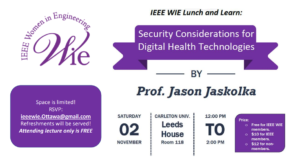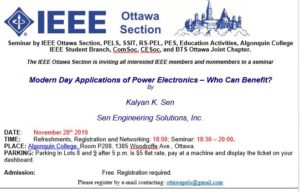Events

Registration is required. Space is limited!
Attending lecture only is FREE, refreshments will be served.
Attending lecture with lunch afterwards:
- IEEE WIE Members: FREE
- IEEE Members: 10 CAD
- Non-members: 12 CAD
Agenda:
12:00 – 01:00 PM: Seminar
01:00 – 02:00 PM: Lunch
Â
Seminar Information:
ABSTRACT:
Given the fast pace of innovation in digital health technologies, specifically in relation to the evolution of medical devices with more complex software and increased network connectivity, a new frontier of cybersecurity vulnerabilities has emerged. As a result, designers of such technologies face many challenges and must consider many inter-related factors that contribute to such an insecure environment.
In this talk, we will identify the key classes of vulnerabilities to which modern medical devices and digital health technologies are exposed, discuss the security and privacy challenges in designing these technologies, and outline some of the defensive measures that can address this complex and multi-faceted problem.
BIOGRAPHY:
Dr. Jason Jaskolka is an Assistant Professor in the Department of Systems and Computer Engineering and the Director of the Cyber Security Evaluation and Assurance (CyberSEA) Research Lab at Carleton University. He received his Ph.D. in Software Engineering in 2015 from McMaster University. His research interests include cybersecurity evaluation and assurance, security-by-design, and formal methods and algebraic approaches for software and security engineering. He is interested in applying his research to critical infrastructures, cyber-physical and distributed systems, and the Internet of Things (IoT).
Lunch Information:
Located on the 3rd Floor Residence Commons, the caf is an all-you-care-to-eat dining hall featuring 14 unique stations that offer a wide variety of food choices.Â
More information:Â https://carleton.campusdish.com/LocationsAndMenus/TheCaf?locationId=5087&storeIds=&mode=Daily&periodId=2084&date=11%2F2%2F2019

Abstract – Application of power electronics is widespread in everyday
life. Some applications are considered as “nice to have it;†in other cases,
they are essential. This presentation discusses a wide variety of daily-used
applications around the world. Also covered is an advanced topic, such as SMART
Controller that today’s grid requires for voltage regulation, power factor
regulation, unbalance voltage/current regulation, harmonic elimination and so
on. A SMART Controller that is based on functional requirements and
cost-effective solutions is derived from utilizing the best features of all the
technical concepts that are developed until now. Final year students of
electrical engineering undergraduate curriculum, post graduate students,
researchers, academicians and utility engineers will benefit from attending
this course. The participants will hear from an expert who actually designed
and commissioned a few utility-grade SMART controllers since their inception in
the 1990s.
Â
Speaker’s
Bio
Kalyan Sen, a
Fulbright Scholar, is the Chief Technology Officer of Sen Engineering
Solutions, Inc. (www.sentransformer.com) that specializes in
developing SMART power flow controllers—a functional requirements-based and
cost-effective solution. He received
BEE,
MSEE, and PhD degrees, all in Electrical Engineering, from Jadavpur University,
India, Tuskegee University, USA, and Worcester Polytechnic Institute, USA,
respectively. He also received an MBA from Robert Morris University, USA.
Â
Dr.
Sen spent more than 30 years in academia and industry and became a Westinghouse
Fellow Engineer. He was a key member of the Flexible Alternating Current
Transmission Systems (FACTS) development team at the Westinghouse Science &
Technology Center in Pittsburgh. He contributed in all aspects (conception,
simulation, design, and commissioning) of FACTS projects at Westinghouse. He
conceived some of the basic concepts in FACTS technology. He has authored or
coauthored more than 25 peer-reviewed publications, 8 issued patents, a book
and 4 book chapters in the areas of FACTS and power electronics. He is the
coauthor of the book titled, Introduction
to FACTS Controllers: Theory, Modeling, and Applications, IEEE Press and
John Wiley & Sons, Inc. 2009, which is also published in Chinese and Indian
paperback editions. He is the co-inventor of Sen Transformer.
IEEE Women in Engineering is pleased to announce a lunch and learn on “Women’s Impact in the Industry†presented by Eng. Mohammed Ali Rencüz
TITLE: Women’s Impact in the Industry
ABSTRACT:
Life in the software engineering world, some networking theory, and women’s impact in the industry!
Location: 4359 Mackenzie Building, Carleton University.
Map: https://carleton.ca/campus/map/
Time: 12:00-2:00 PM
Date: November 30th, 2019
Lecture Admission is FREE!
Lunch: FREE for IEEE WIE members / $12 others
RSVP is required for Lunch: manarhelal@ieee.org
BIOGRAPHY: Carleton University alumnus with B. Eng. Degree in Computer Systems. He is currently working as a Software Engineer in Cisco Systems.

Seminar by IEEE Ottawa Section, PELS, SSIT, RS-PEL, PES, Education Activities, Algonquin College IEEE Student Branch, ComSoc, CESoc, and BTS Ottawa Joint Chapter.
The IEEE Ottawa Section is inviting all interested IEEE members and nonmembers to a seminar
Modern Day Applications of Power Electronics – Who Can Benefit?
ByÂ
Kalyan K. Sen
Sen Engineering Solutions, Inc.
DATE:
November 28th 2019
TIME:
Refreshments, Registration and Networking: 18:00;
Seminar: 18:30 – 20:00.
PLACE:
Algonquin College, Room P208, 1385 Woodroffe Ave., Ottawa.
PARKING:
Parking in Lots 8 and 9 after 5 p.m. is $5 flat rate, pay at a
machine and display the ticket on your dashboard.
ADMISSION:
Free. Registration required.
Please register by e-mail contacting: ottawapels@gmail.com
Abstract:
Application of power electronics is widespread in everyday life. Some applications are considered as “nice to have it;†in other cases, they are essential. This presentation discusses a wide variety of daily-used applications around the world. Also covered is an advanced topic, such as SMART Controller that today’s grid requires for voltage regulation, power factor regulation, unbalance voltage/current regulation, harmonic elimination and so on. A SMART Controller that is based on functional requirements and cost-effective solutions is derived from utilizing the best features of all the technical concepts that are developed until now. Final year students of electrical engineering undergraduate curriculum, post graduate students, researchers, academicians and utility engineers will benefit from attending this course. The participantswill hear from an expert who actually designed and commissioned a fewutility-grade SMART controllers since their inception in the 1990s.
Modern Day Applications of Power Electronics – Who Can Benefit
IEEE Photonics Society Distinguished Lecturer Program
Advanced semiconductor lasers:Ultra-low operating energy and heterogeneous integration with Si photonics devices
Shinji Matsuo, NTT Photonics Laboratories, Japan
Abstract: The electrical power consumed in data transmission systems is now hampering efforts to further increase the speed and capacity at various scales, ranging from data centers to microprocessors. Optical interconnects employing an ultralow energy directly modulated lasers will play a key role in reducing the power consumption. Since a laser’s operating energy is proportional to the size of its active volume, developing high-performance lasers with a small cavity is important. For this purpose, we have developed membrane DFB and photonic crystal (PhC) lasers, in which active regions are buried with InP layer. Thanks to the reduction of cavity size and the increase in optical confinement factor, we have achieved extremely small operating energy and demonstrated 4.4-fJ/bit operating energy by employing wavelength-scale PhC cavity. Reduction of the cost is also important issue because huge number of transmitters are required for short distance optical links. For this purpose, Si photonics technology is expected to be a potential solution because it can provide large-scale phonic integrated circuits (PICs), which can reduce the assembly cost compared with transmitters constructed by discrete devices. Therefore, heterogeneous integration of III-V compound semiconductors and Si has attracted much attention. For fabricating these devices, we have developed wafer-scale fabrication procedure that employs regrowth of III-V compound semiconductors on directly bonded thin InP template on SiO2/Si substrate. A key to realize high-quality epitaxial layer is total thickness, which must be below the critical thickness, typically 430 nm. Thus, membrane structure is quite suitable for heterogeneous integration. I will talk about our recent progress, focusing on ultralow-powerconsumption directly modulated lasers and their photonic integrated circuit. I will also describe progress in heterogeneous integration of these lasers and Si photonics devices.
Bio: Dr. Matsuo received a B.E. and M.E. degrees in electrical engineering from Hiroshima University, Hiroshima, Japan, in 1986 and 1988, and the Ph.D. degree in electronics and applied physics from Tokyo Institute of Technology, Tokyo, Japan, in 2008. In 1988, he joined NTT Optoelectronics Laboratories, Atsugi, where he was engaged in research on photonic functional devices using MQW-pin modulators and VCSELs. In 1997, he researched optical networks using WDM technologies at NTT Network Innovation Laboratories, Yokosuka. Since 2000, he has been researching InP-based photonic integrated circuits including fast tunable lasers and photonic crystal lasers at NTT Photonics Laboratories, Atsugi. Dr. Matsuo is a member of the IEEE Photonics Society, Japan Society of Applied Physics and the Institute of Electronics, Information and Communication Engineers (IEICE) of Japan.

